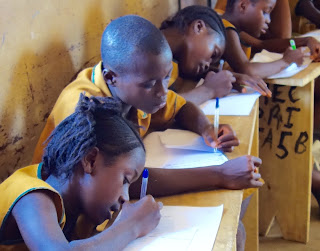Saturday, January 25, 2020
What Primary School "Young Writers" Write About
Teachers usually prepare upper primary school students in Sierra Leone for the composition component of their Class Six public examination by having them write descriptive essays on topics such as "My Family" and "My Pet."
A few years ago, SELI extended its Young Writers program to rural primary schools. In these ESL process-writing clubs, students in Class 4 to 6 learn to write narrative essays by coming up with a list of their own true personal experience topics, and choosing which one they would like to write on next. They get help with revision by reading their first drafts aloud to their peers and teachers.
A little analysis shows us that the pieces of writing Class 4 to 6 students have produced in Young Writers clubs over the past several years fall into five general content categories, listed here.
Perceived injustice (theft, abuse, deprivation of food or schooling and false accusation, either of self or elder sibling or parent). Seeking retaliation, recompense, or sympathy by appealing to relatives or neighbours, crying loudly, or running away. Boys choose this topic more often than girls.
Loss (or life-threatening injury or illness) of a family member or close friend. Nearly all of them write about death. They lack the age-appropriate writing skills to describe how it makes them feel (apart from saying, “I cried and cried.”) or what the loss means for them (ways in which this person had provided love, humor, security, tuition, protection against harm, food, shelter, and so on).
Friendship. The friends who are willing to accompany them to carry out an assigned task, and the support a best friend gives when they are in trouble.
Injury, often while carrying out tasks for adults. Includes how to travel to a health centre and pay for medical treatment. They all mention having to miss school but do not describe what that means to them. Their accidents can be categorized in this way:
vehicle (hit by an okada [motorcycle taxi] or car)
domestic (in kitchen, at stream, at market, house fire, severe flogging)
play (while playing football, running)
animal frights or bites (by a snake, dog, scorpion, monkey)
farm (fall from tree, cutlass injury, falling branches, flooding)
Venturing away from home. Whether they will find a friend there, be treated well, and succeed.
holiday period with aunt/uncle
experience at school, farm, beach
travel to another town/city
Being underestimated is a common underlying theme—rarely a writing topic in itself. Understanding the meanings implied in what adults actually say, or not being allowed to explain their observations because they are children.
Forgiving a remorseful wrongdoer is another common underlying theme. The author will end a story about the pursuit of a thief with the author’s elders forgiving the person and giving their reason. Sometimes when the perpetrator is a schoolmate, the piece ends with the author doing the forgiving with a similar reason.
Perhaps you would agree that in terms of writing, primary schools might be under-challenging their pre-teen students!
Subscribe to:
Post Comments (Atom)


No comments:
Post a Comment
We look forward to hearing from you!